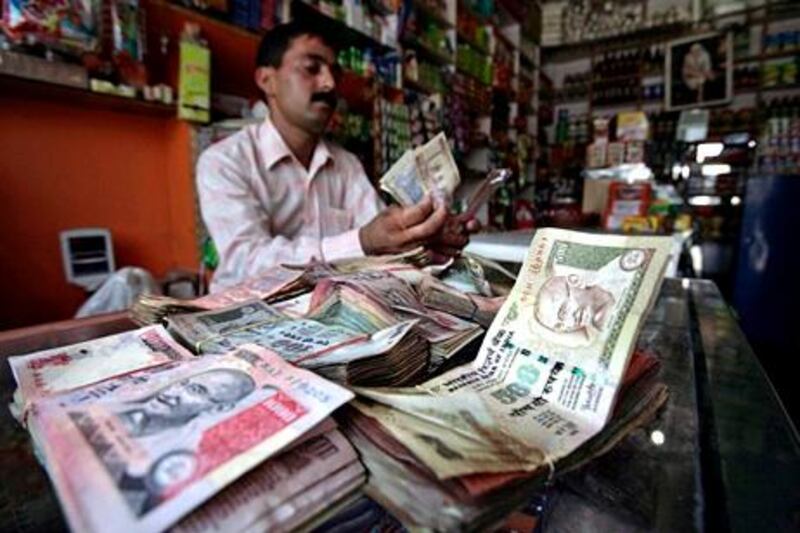The Indian rupee has fallen to a 10-month low against the US dollar.
Renewed softness in the currency is providing an opportunity for Indian workers in the UAE to send more money home, but the weak rupee is negative for India's push to attract more foreign investment.
The dirham is pegged to the US dollar, so its strength means that more rupees can be bought by each dirham.
"Though Indian expats are making merry by taking advantage of the rupee fall to remit more money home, the nation's economy is definitely not in its best phase now," said Promoth Manghat, the vice president of global operations at UAE Exchange.
There does not seem to be "any positive sign for the rupee going up the ladder", he added.
India is the largest recipient of remittances in the world, receiving US$69 billion last year, according to the World Bank. The Middle East is the region from which India receives the biggest flows of remittances.
The rupee on Wednesday weakened to 56.3 against the dollar during trading. This meant that Dh1 was worth more than 15 rupees. The rupee has declined by about 4 per cent against the dollar since the beginning of the month.
"The weakness of the rupee in recent weeks is predominantly due to international factors," said Naveen Mathur, the associate director, commodities and currencies, at Angel Broking.
"The dollar index is gaining strength and that is one of the major reasons which is having a weakening effect on the rupee. That's because of the Fed talking about the reversal of QE in due course and at the same time the US data is also coming a little positive."
A weak Indian rupee is negative for India in terms of its current account deficit, which is already a concern. As a major importer, a weaker currency drives up the costs of imports, which can widen the current account deficits.
"The weakness of rupee definitely leads to pressure on imports," said Mr Mathur. "Weakness in the currency impacts the financial balance sheet and the same time it impacts the brand which you carry for a country. If you're looking for inflows coming in from the foreign markets, FDI, the rupee weakness will definitely impact the kind of returns which these organisations would look for."
"With the rupee plunging by around 2 per cent in just [over] a week, this is good news for the non-resident Indian community, who are in the habit of remitting money to India regularly," said Adeeb Ahamed, the chief executive of Lulu International Exchange.
But the effects in India are largely unfavourable. "It is a cause of concern for policymakers, investors, businessmen and even the common man," said Mr Ahamed. "The depreciating rupee raises the price of imports. India mainly imports crude oil, fertilizers and gold. This, in turn, has a domino effect on cost of living and inflation."
P Chidambaram, India's finance minister, met Sheikh Mohammed bin Zayed, Crown Prince of Abu Dhabi and Deputy Supreme Commander of the Armed Forces, and Sheikh Hamdan bin Rashid, Minister of Finance, on Sunday to discuss relations and investment between the countries.
This was part of a series of roadshows that Mr Chidambaram has been undertaking to attract investment to India, which has also included visits to Paris, Doha, and London.
Data to be released soon is expected to show that India's economy slowed to the lowest level of growth in a decade in the last financial year. Adding to India's economic woes, the ratings agency Standard & Poor's this month warned that India still faces a one-in-three chance of having its credit rating downgraded to junk status within the next year.





